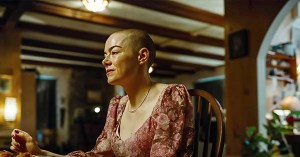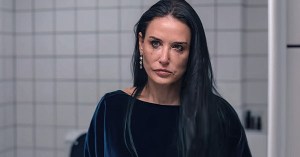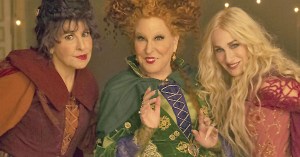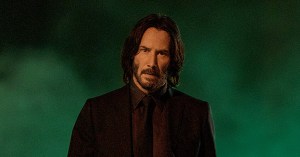Zack Snyder Wants To Tap Into Your “Inner Gore Child” With Horror-Heist Hybrid Army of the Dead
The director talks undead tears, extending his "hard R" Army world, and why two-and-a-half hours is a perfectly fine runtime for a zombie flick.

(Photo by Clay Enos / © Netflix)
We’re not even six months into 2021 and director Zack Snyder has already enjoyed back-to-back triumphs: the epic superhero corrective, Zack Snyder’s Justice League, which landed on HBO Max in March after years of fan campaigning, and now Army of the Dead, his long-awaited return to the zombie genre, which opened in theaters last week and arrives on Netflix this Friday. The movies – with Tomatometer scores of 71% and 76% respectively – are his best reviewed works since his debut, Dawn of the Dead, back in 2004.
While Army is no direct sequel to Dawn – different characters, different kinds of zombies here – it’s clear Snyder is relishing playing with the undead again, and this time with a totally original story. A heist movie/zombie movie mashup, Army sees a ragtag group of soldiers and mercenaries, led by Dave Bautista’s Scott Ward, heading into a walled-up Las Vegas that’s teeming with zombies to pull off one last heist. As critics have noted, it’s Snyder unfettered: full of gore, awesome soundtrack choices, plenty of slo-mo, and heart-on-your-sleeve, earnest emoting… even from the zombies.
Ahead of the movie’s release on Netflix, Snyder spoke to Rotten Tomatoes about the “most fun” movie-making experience of his life, building a new kind of zombie lore (and getting audiences to root for “Team Zombie”), and his no-holds-barred plans to expand the Army of the Dead world with more films and a “very adult” animated series. (Warning: the below interview contains minor spoilers for Army of the Dead.)
Joel Meares for Rotten Tomatoes: Congratulations on the movie, Zack, and congratulations on the surprise theatrical run. Why is this a good film for audiences to see on the biggest screen they possibly can – if it’s safe – right now?
Zack Snyder: By the way, if that big screen happens to be in your living room, by all means [watch it there]. But being at the theater, it’s a fun movie to see. Listen, when I made the film, there was no vision of this movie being in a theater. I didn’t even care to ask. I was like, “No, I appreciate you, Netflix, saying yes to this idea, and so I will honor you and your platform by making a movie specifically for this world.” And it was Netflix that came to me and said, “Hey, is it cool if we release the movie on the big screen as well?” And I said, “Absolutely, that would be amazing.” And it’s worked out great. The movie plays really well on a giant screen. In a lot of ways, it’s a lot of movie on a big screen. We went bigger than we normally would because it was going to be this big [gestures a small TV size], so I was like we might as well just blow the doors off it since you’re going to watch it at home. So in the theater it plays awesome.

(Photo by Clay Enos / © Netflix)
Rotten Tomatoes: It does so from the moment it starts with that credits sequence. When the social media embargo lifted, and then we were reading the reviews, everyone was like: This is the biggest credits sequence I think I’ve ever seen, or at least the biggest Zack Snyder credit sequence. Why did you want to go so big and put so much into that montage – and how challenging was that to pull off?
Snyder: It was pretty challenging. I will say though that, like anything, I wanted to make sure that this … Well, this was a movie about veterans. These are veterans. The old gunslingers. They go for one last mission. That was the movie, and it always was, but I wanted to tell the story of their journey and their war story in the title sequence. I just felt like it was important that we let you know in the title sequence that they had suffered trauma and they’d gone all the way into the heart of darkness with their journey in the zombie fall of Vegas.
I also wanted to trick you a little bit with it, like the movie does. It’s a small metaphor for the actual experience of the movie. It looks like a lot of zombie fun and there’s a lot of hijinks, and then suddenly you find yourself caring about these guys. And there’s a lot of drama and there’s a lot of heartbreak. But then in the end, you realize that you’re in this “let’s do it again” kind of a world. That was something I wanted to express on a small scale in the title sequence.
Rotten Tomatoes: I think the film really does that balance so well, between the spectacle and the gore, and then these emotional relationships, particularly between Dave [Bautista] and Ella [Purnell], and then also between Matthias [Schweighöfer] and Omari [Hardwick], which I absolutely loved. Why was it so important for you to home in on and really develop these strong bonds between certain characters?
Snyder: That’s the “why” of the movie in a lot of ways – in the end you can go on a zombie romp, but what is the “why” of it? And I think that in the end, it’s those human relationships that make us care and make it important, and the characters you want to see live, and the ones that sacrifice, and the ones that you want to see not make it, you start rooting in all different directions. And I think that in the end this is the “why” of making a big movie and going on this big journey. It’s really a fun and exciting place to be if you care.

(Photo by Clay Enos / © Netflix)
Rotten Tomatoes: You went even further than that in some ways. There are certain zombies we come to care for!
Snyder: Yes, it was important to me that [we cared about the zombies], if it was possible. I remember when we were talking about this at the early days, I was like, I want people to be Team Zombie at some point. I want there to be people that are like, “I really hope that Zeus makes it.” That’s what I want. Or him and his queen to start a new world somewhere. I think that would be amazing. And I just think that’s the rare thing in a zombie film: empathy for the zombies.
Rotten Tomatoes: Yeah, because it’s a completely new spin. I mean we’ve had empathy for zombies, but generally because you see the previous character that was there and you know the relationship between the person who’s alive, but we hadn’t really seen society-forming, thinking zombies. And it’s almost a Planet of the Apes development here.
Snyder: Yeah, I really love the Planet of the Apes reference because that’s what I was going for in a lot of ways. I love the idea that Zeus… he cries, frankly, in the movie. And I know it sounds like a joke when I say a zombie cries in this film, but I think when you see it in context that you don’t bat an eye. It’s just, like, of course he would. Who wouldn’t? And I think that even just the notion that… the switching of the thing where you go into that world thinking we’re just going to kill any zombie we see, but then you realize that in the end, the humans are double crossing, and they’re not honoring the deal, and all of that. I just think that’s super fun to wonder who’s the honorable one in the scenario.

(Photo by Clay Enos / © Netflix)
Rotten Tomatoes: It was really refreshing, and that all came from you, because, if I’m correct, this is your second project after Sucker Punch that’s entirely original as opposed to an adaptation. What’s the difference in the experience between adapting something that is beloved and trying to do that justice, and doing something where you have free rein and it’s all come from your own mind?
Snyder: First, I mean just to say, Sucker Punch – and I loved the movie and it’s awesome – but it was one of those things we pitched as a hard R, crazy, R-rated movie. And the studio asked us to make a PG-13 and we were like okay, to do it, we’ll do it. And Army of the Dead is a movie where Netflix has been 100% with us. I go, “It’s an R-rated movie all the way,” and they were like, “Awesome, go for it.” I think it just allows the true original vision of the movie to keeps it integrity. And you can feel that when you watch the movie, that it’s singular. I think the singularity of it is the thing that makes it so you go into that world and you buy it at every turn.
And when you’re dealing with something like the DCEU, which is such hyper-focused IP where the studio is doing a lot of the decisions out of playing defense with the idea, they’re constantly just trying to protect their back, it’s hard to score when you play defense. It’s just difficult. You can see it. A lot of the decisions feel like they’re made in a… I mean that’s the one thing about what I got to do with Justice League, finally it’s just like okay, just go and do it. And that was fun for me.

(Photo by Clay Enos / © Netflix)
Rotten Tomatoes: So, would you say this is one of the most free experiences you’ve had making a film?
Snyder: Yeah, I would say for sure it was the most fun I’ve had making a movie. I mean pure fun every day, day in and day out. These actors, these scenarios – we knew it was crazy, and so it’s fun to do. When you’re having Dave Bautista run down across the tables in a casino firing a machine gun and zombies are diving all over the place, I mean, I’d say “cut” and I would literally be laughing, like, okay, this is ridiculously awesome. Or even just taking Garret [Dillahunt] and throwing him around on these wires, and that’s going to be a zombie shaking him to death…. It was pretty funny, but we didn’t not take it seriously or not try and make it at its highest level, but we still had the joyous child-like glee from the experience.
Rotten Tomatoes: And I think the audience will share that feeling, because you watch that scene with Garret and that tiger and it’s just delightful in its gory way.
Snyder: Yeah, I know. If you can’t have fun watching that in the movies, then you’ve lost touch of your inner gore child that is waiting to get out.
Rotten Tomatoes: I want to talk to you about runtimes, because it’s a two-and-a-half hour zombie movie, and we’ve come off a four-hour Snyder cut, Zack Snyder’s Justice League. What do you say to people who think a popcorn movie needs to be two hours, that’s what an audience can handle, that’s what makes for good pacing, when you’re delivering these long movies that people are eating up?
Snyder: I don’t know. I mean, the record doesn’t hold that. If you go look at the top box office movies of all time, Jim Cameron sure doesn’t make short movies, I’ll tell you that. You know what I’m saying? And Lord of the Rings is no matinée quickie and is better for it; the Dark Knight trilogy, they’re not short movies. And the movie’s as long as it is. I don’t think you can back into it that way. I mean yeah, you have a target, you have an area, two-and-a-half hours. Beyond that, sure, we’re constantly trimming. Was the first pass of Army of the Dead three hours, three-and-a-half hours? Probably. I was conscious of it. I was like, “Oh, it’d be good if it was just under two-and-a-half hours. That’d be good.”

(Photo by Clay Enos / © Netflix)
Rotten Tomatoes: And we’re actually getting more of this world, right?
Snyder: There’s an animated series, a prequel. I’m directing two of the episodes of the animated series. Yeah, it’s fun. And I came up with the story with Shay [Hatten, co-screenwriter of Army of the Dead] and well, because Shay and I actually, we were ready to go if there was a sequel that anybody ever wanted, we know how to do it, and so the world of the animated series is directly related to what would be the world of the sequel. So I really had to very carefully plan out and construct the entire “what happens in that world” in the world of the animated series. And then the prequel, also Shay and I wrote the story for that. That’s another genre bender – Matthias [Schweighöfer] directed basically a romantic comedy heist movie. We constantly keep doing this genre mashing.
Rotten Tomatoes: Can you give us a sense of what we can expect from the animated series?
Snyder: In the animated series, we trace the origins of the zombie plague, not only where it came from, but then its actual origins and what is the “why” of it. And from a scale standpoint, it’s hilarious. It really is a crackup if you can imagine the kind of things that you could do in animation, where there’s no rules and nothing to stop you.
Rotten Tomatoes: Also a hard R rating?
Snyder: Oh God, yeah. It’s very adult animated series, yeah. Very adult.
Army of the Dead is in theaters now and available on Netflix from Friday May 21, 2021.






